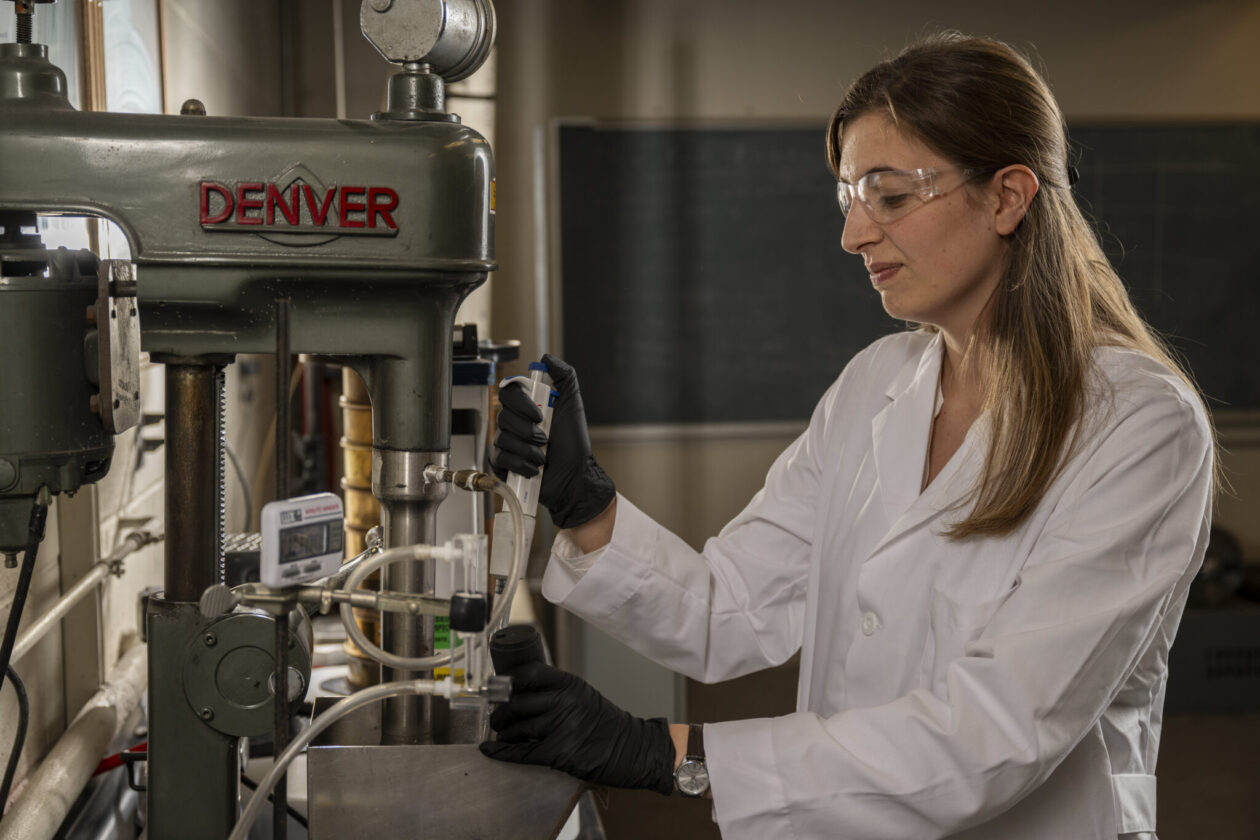National Engineers Week: Q&A with Hazal Melis Aytac, Ph.D. student in mining engineering
Posted by Greg Edwards

Photo: Hazal Melis Aytac works in a Missouri S&T mineral processing laboratory. Michael Pierce/Missouri S&T.
Hazal Melis Aytac, of Turkey, is a Ph.D. student in mining engineering at Missouri S&T. Here is a Q&A with Aytac in commemoration of National Engineers Week 2025.
What first inspired you to study mining engineering?
When choosing my field of study, I was certain that I wanted to pursue engineering. Among the various engineering disciplines, I was particularly drawn to earth sciences. My interest in natural resources eventually led me to mining engineering, where I could apply an engineering approach to real-world challenges.
In basic terms, how would you describe what the field of mining engineering encompasses, and why is this an important discipline?
Humankind has been mining and processing ore to create tools, art and technology since ancient times. Mining engineering is the discipline that encompasses mainly the extraction and processing of mineral resources safely and efficiently.
It plays a crucial role in modern society by providing raw materials for infrastructure, energy production and technological development, as well as addressing environmental and economic challenges. For instance, smartphones contain metals like lithium, cobalt, nickel, copper, gold and rare earth elements, which come from various minerals found in nature. Mining engineering is the first step in extracting and processing valuable minerals to make them usable.
What aspect of your discipline do you find most fascinating?
I am currently studying the field of mineral processing, involving both physical and chemical concentration methods of the extracted rocks from the Earth’s crust. To put mineral processing in simple terms, imagine you have an ore where the valuable mineral is mixed or locked in with undesired ones. The goal is to separate and concentrate the valuable part as much as possible.
Some ores can be processed using well-known methods, while others require new technologies and creative combinations of well-known methods. Therefore, exploring the most economical and sustainable ways to enrich the desired minerals is truly fascinating. Using knowledge from related disciplines makes this process easier, taking into account mineral formations, structure and characteristics.
The theme for National Engineers Week 2025 is “Design Your Future.” How does your work as a Ph.D. student fit with this?
The theme for National Engineers Week 2025 aligns well with my work as a Ph.D. student. I am focusing on the re-process of mineral tailings generated from past mining activities and mineral processing operations. My research contributes to creating a more ecological world for future generations by exploring sustainable practices in this area. This work not only addresses environmental concerns but also opens new opportunities for resource recovery and waste reduction in the mining industry.
What do you hope to do after finishing your Ph.D. program at Missouri S&T?
I hope to continue contributing to sustainable mineral processing and the re-processing of mining wastes. Whether in academia, industry or research institutions, my goal is to develop innovative and environmentally responsible solutions for mineral processing operations. I want to ensure that future generations benefit from a more responsible approach to mineral extraction and processing.
What advice would you have for those interested in studying mining engineering?
If you’re thinking about studying mining engineering, my advice would be to stay open to learning from different fields like statistics, chemistry, computer science, geology and metallurgy. Mining is more than just extracting materials and then processing them to produce concentrates; it’s about finding sustainable, safe and efficient ways to do it. Additionally, getting hands-on experience through internships or lab work can really help you understand the industry needs better.
Leave a Reply